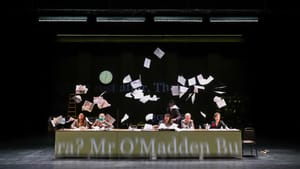Stay in the Loop
BSR publishes on a weekly schedule, with an email newsletter every Wednesday and Thursday morning. There’s no paywall, and subscribing is always free.
An abridged Ulysses covers all the bases
Philly Fringe 2024: Elevator Repair Service presents James Joyce’s Ulysses

It’s a question that has plagued scholars, students, and readers for a century: how to approach Ulysses, the nearly unapproachable 1922 tome of a novel by James Joyce. A Curated Fringe Festival staging by Elevator Repair Service (ERS), co-directed by Scott Shepherd and John Collins, seems to have an answer.
The New York-based troupe has equal interests in iconic 20th-century literature and madcap physical theater, and this presentation, onstage at FringeArts through Saturday, September 7, comes on the heels of its global premiere at Bard College’s SummerStage Festival in June.
The epitome of modernist literature
Ulysses is one of those famous books that most people haven’t read, but most—certainly most English majors—know something about. Hailed as the epitome of modernist literature, its 700+ pages meander through one day in 1904 Dublin, centered around the movements of one citizen, Leopold Bloom, while encountering dozens of characters as the plot loosely parallels the tale of Odysseus. The text’s stream-of-consciousness style is full of allusions, humor, bawdiness, and untranslated dips into other languages, but without the benefit of much punctuation or paragraphs.
At the outset, a narrator played by Shepherd (who’s also credited as dramaturg) informs us that the entire text will be rolling on a screen behind the audience.
“We have a limited amount of time, so we’re probably going to fast-forward a bit,” he explains. And the scroll literally and audibly fast-forwards, sometimes shocking the actors like an electrical current, other times causing them to move in hyper speed, and at still others, they ignore it entirely.
Capturing an elusive volume
Over the course of nearly three hours, seven actors play multiple roles, regardless of gender. As in the book, you often find yourself slightly behind in following the action as you identify who’s who and what’s going on. The actors deftly vary their accents, physical movements, and facial expressions as they create different characters, using few props and costuming.
A reader with a more thorough knowledge of Ulysses might argue the finer points of ERS’s abridgment, but from my single encounter with the novel, they seem to successfully capture the 700+ pages of this elusive volume. The multitude of characters are there, as are the scenes around Dublin and some of the most memorable lines.
For the latter, they uncharacteristically deliver the soliloquy which ends the book by Molly Bloom, Leopold’s faithless wife, seemingly in its entirety, in a more spare and slow-moving style than the rest of the play. Perhaps, after all their gleeful slicing and dicing through the scenes, they were unwilling to tamper with what arguably is the most famous episode in the book, or could it be seen as a thoughtful winding down of the narrative? Like so much of Ulysses, it’s there to interpret. And to be argued over.
BSR is one of the only publications left in town reviewing Philly’s theater scene! You can support our hardworking Fringe reviewers with a donation today.
What, When, Where
Ulysses. Text by James Joyce with dramaturgy by Scott Shepherd, directed by John Collins. $49 ($15 for students and anyone under 25). September 5-7, 2024, at FringeArts, 140 N Columbus Boulevard, Philadelphia. (215) 413-1318 or phillyfringe.org.
Accessibility
FringeArts Theater is a wheelchair-accessible venue with gender-neutral restrooms. Hearing-assisted headsets are available. Complete accessibility information is available on the FringeArts website. Ulysses contains periodic use of fog, bright lights, and loud noises.
Sign up for our newsletter
All of the week's new articles, all in one place. Sign up for the free weekly BSR newsletters, and don't miss a conversation.
